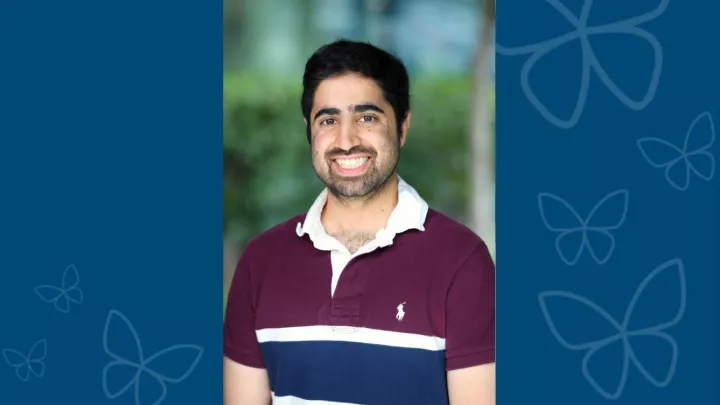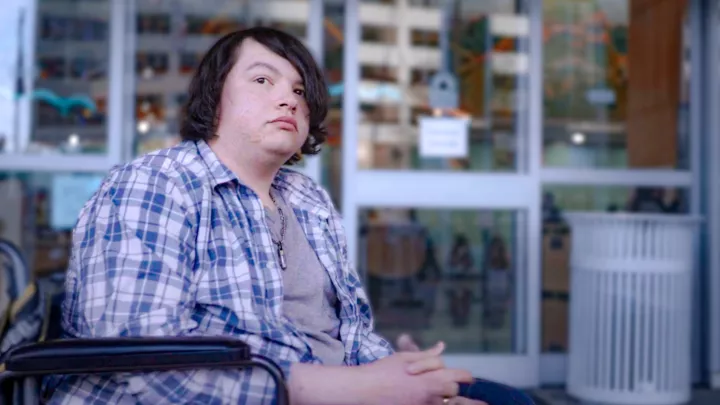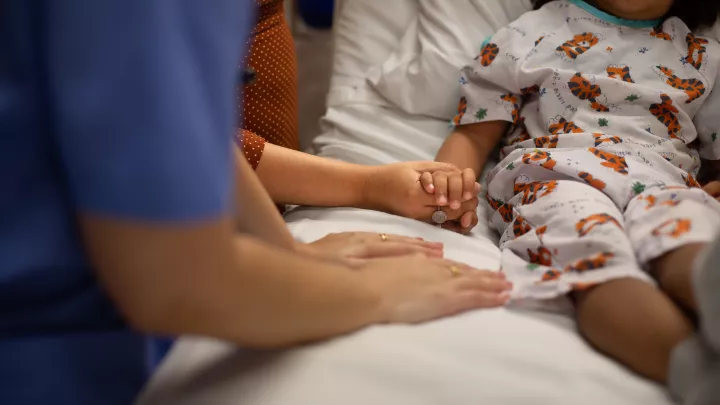Sickle Cell Disease Program
Sickle cell disease is a rare inherited blood disease affecting red blood cells and their ability to deliver oxygen. The condition can make life unpredictable for your child, but there’s hope. Children’s Hospital Los Angeles is home to one of California’s leading sickle cell disease programs.
Teams of specialists work together to address your child’s immediate care needs. We also coordinate therapies to lower complication risks. Family-focused support makes living with sickle cell disease a little less stressful and helps you plan for your child’s future. Our comprehensive approach helps more children live life to the fullest.
Sickle Cell Disease Care: Why Choose Us
CHLA is a National Alliance of Sickle Cell Centers (NASCC) member center. NASCC recognizes programs with experienced sickle cell providers who offer advanced, high-quality sickle cell care. More pediatricians recommend us to provide specialized sickle cell care for their patients, and more families put their trust in us. Treating so many patients gives us a depth of experience that leads to exceptional care for your child.
Part of CHLA’s internationally recognized Hematology program, our sickle cell disease services include:
- A highly skilled team: A team specializing in pediatric sickle cell disease treatment guides your child’s care. The team includes a blood disease doctor (hematologist), nurse practitioner, social worker and case worker. Our coordinated approach means your child receives seamless services, including treatments, specialist care and support. Meet our team.
- Personalized care: Getting to know your child and family is important to us and enables the team to customize services. Whether it’s adjusting therapies or answering questions, our careful attention helps your child get the most out of each treatment.
- Support: Having a child with sickle cell disease can bring unexpected changes, including daily medications and regular care appointments. We help ease this burden with a broad range of support services. Social workers and case workers are here to support you and to help ease or remove barriers to your child getting the care that they need. We can help you address challenges such as transportation and food insecurity, and we offer resources for advocacy with school professionals and mental health care.
- Innovation: Research at CHLA is advancing sickle cell disease care. We are exploring the causes of complications such as silent stroke, and safer care approaches. Your child may be eligible to participate in these efforts through clinical trials. Find out more about our research and clinical trials.
What Is Sickle Cell Disease?
Red blood cells contain hemoglobin, a protein that helps carry oxygen. Sickle cell disease causes abnormal hemoglobin that is stiff. This stiff hemoglobin causes red blood cells to take on a hard, crescent-like shape instead of being round and flexible. The abnormal shape limits the amount of oxygen your tissues and organs receive.
Sometimes sickle cells clump together, blocking small blood vessels and leading to a sickle cell crisis. A crisis may cause severe pain attacks requiring immediate treatment and raises the risk of complications, such as stroke. In the U.S., sickle cell disease most commonly affects people of African descent. It also affects people from Central America, South America, India and some Mediterranean countries.
Easy Care Access for Sickle Cell Crisis
Our fast track for acute care management delivers timely treatments for children in sickle cell crisis. The clinic provides prompt access to blood transfusions, medications and other services, so your child can get much-needed relief. This option helps your child avoid an emergency room visit and receive care from a known and trusted team.
The fast track for acute care is available Monday through Friday from 8 a.m. to 5 p.m. for existing CHLA patients. Call 323-361-4624 to speak to a nurse about your child’s symptoms and schedule an appointment.
Comprehensive Sickle Cell Treatment
Sickle cell disease can affect the entire body. We work closely with other CHLA pediatric specialists to prevent and treat complications.
Your child may receive care from:
- Dietitians: Sickle cell disease can cause hypermetabolism, which is when the body uses calories faster than it receives them. Our dietitians create a balanced, high-nutrient diet plan to help your child grow well and reduce some sickle cell symptoms.
- Eye doctors (ophthalmologists): Blood vessel damage in the back of the eye can lead to retinopathy, which can affect your child’s vision. Renowned ophthalmologists in The Vision Center deliver specialized care to help prevent this issue.
- Heart specialists (cardiologists): People with sickle cell disease are at higher risk for heart problems. Our expert cardiologists can monitor your child’s heart and quickly treat any complications that may occur.
- Lung specialists (pulmonologists): Sickle cells in the lungs can lead to acute chest syndrome, causing chest pain, coughing and low oxygen levels. Our team includes pulmonology specialists with expertise in sickle cell disease.
- Neuropsychologists: We evaluate the possible impact of sickle cell disease on your child’s thinking, attention and ability to learn. This information helps us coordinate additional services and support if necessary.
- Pain medicine team: Sickle cell disease can cause significant pain, especially during a sickle cell crisis. Our pain medicine experts create a customized treatment plan for pain management. We also help your child cope with the physical, social and emotional effects of pain.
- Specialized hematologists: Your child will be cared for by a hematologist with expertise in sickle cell disease. If necessary, your child may also see a hematologist who specializes in iron overload disorder. Frequent blood transfusions can cause an abnormal buildup of iron, with the possible risk of organ damage. We are one of the few programs in the country detecting these issues in earlier stages. Explore our iron overload disorder care.
Support for Children and Families Living With Sickle Cell Disease
Our support services include:
- Child Life specialists: These specialists make care visits easier on your child. They use age-appropriate methods to reduce anxiety and help children communicate their needs. Find out more about our Child Life Program.
- Language and communication services: If English is not your first language, qualified interpreters and translators help you communicate with your child’s care team. Get more information about Interpreting and Translation Services.
- Mental health and education support: We help give children and families the best possible quality of life with comprehensive support services. Find out more about the HOPE Behavioral Health, Neuropsychology and Education Service.
- Transition program: We set the stage for young adults to smoothly transition to adult blood disease specialists. Our team teaches adolescents to take ownership of their care and make appropriate health care decisions. Read more about the PASSAGES Transition Program.
- School Transition and Re-Entry (STAR) Service: Our school re-entry specialists support your child when returning to school after long hospitalizations. We help you access school accommodations that enable your child to succeed academically. Learn more about the School Transition and Re-Entry Service.
Hematology Care at Children’s Hospital Los Angeles
At Children’s Hospital, your child has access to innovative treatments and leading-edge care for blood diseases. Learn more about our Hematology programs and services.
Contact us
The Cancer and Blood Disease Institute welcomes new patients, referrals and second opinions. Please call us to make an appointment.
- Existing patients: 323-361-4624
- New patients, referrals and second opinions: 323-361-4100


